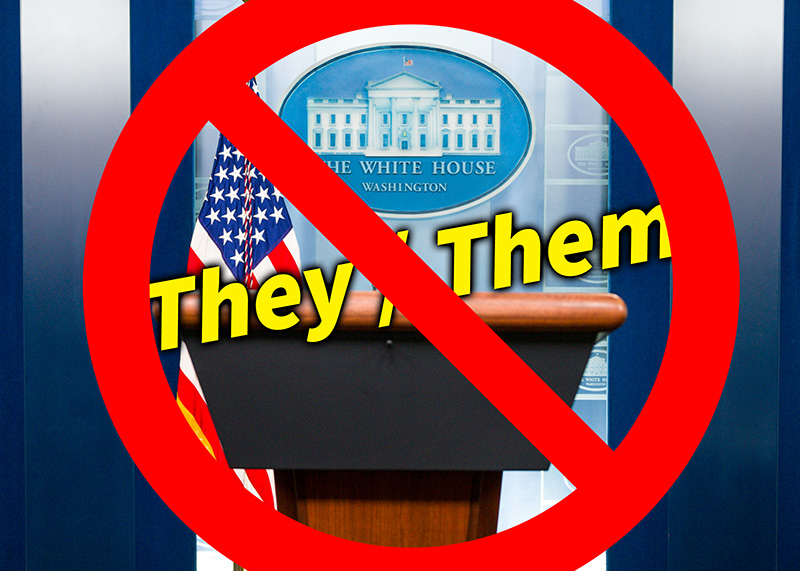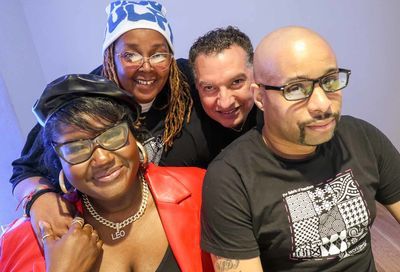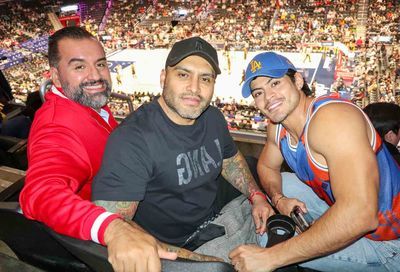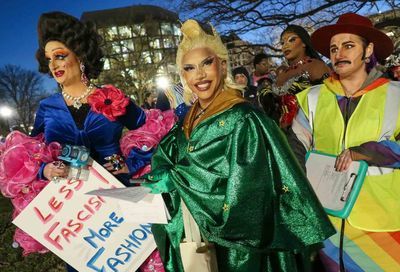Trans wrestler Mack Beggs fights for recognition in Hulu’s new doc “Changing the Game”
Conservatives barred trans teen Mack Beggs from wrestling as a boy in high school. Hulu's "Changing the Game" recounts his story.

“I always knew I wanted to do a combat sport,” says Mack Beggs. “I always knew that somehow I wanted to get handsy, and just dribbling a ball or moving with my hands or feet wasn’t enough. When I found out that wrestling was something that I could do in my ninth-grade year, in junior high, I was like, ‘Man, sign me up!'”
The 22-year-old, currently attending Life University in Marietta, Georgia, won two state wrestling titles during his high school years in Euless, Texas. It was there that he came out as transgender, beginning his social transition in seventh grade, and his physical transition in ninth grade. And it was there that Beggs gained a national profile, after a Texas University Interscholastic League rule forced him to compete in the 110-pound weight class in the women’s division.
Despite taking a smaller dose of testosterone than would typically be prescribed for someone transitioning, and coupling it with a hormone blocker to ensure he wasn’t gaining a significant competitive advantage or running afoul of UIL policies on steroid use, fellow students — and a number of parents — argued that the hormone therapy created an unfair imbalance in his matches. As a result, many critics — especially in conservative-leaning media — objected to his participation, thrusting the then-teenager into the media spotlight against his will.
Although it was Texas lawmakers and UIL officials who refused to budge on the issue — they could have granted a special exemption that would have allowed him to wrestle in the boys’ division — it was Beggs who bore the brunt of criticism and vitriol.
“I always knew, deep down, that with all these policies in place, [UIL officials] weren’t even going to consider allowing me to be on the guys’ team, even though when I first started wrestling, I was wrestling Greco against the guys, and was beating the guys in the room,” he says. “I was like, ‘I don’t want to compete against girls but what can I do?’ I’ve competed all my life. I’m an athlete. That’s what I do, I compete. So I just tried to make the best out of the situation that I could.”
Beggs’ struggles, both on and off the mat, are the chief focus of Changing the Game, the latest documentary from Emmy-award-winning filmmaker Michael Barnett. The documentary focuses on the issue of transgender participation in sports, highlighting the personal stories of Beggs and transgender athletes from other states as they try to compete based on their gender identity.
“It’s interesting in the film, you’re seeing all those people be so angry at the policy. And there’s a disconnect between what the actual policy is and why Mack has to wrestle with girls and the anger is being directed at Mack, but it’s really about the policy,” says Changing the Game executive producer Alex Schmider, who also serves as the associate director of transgender representation at the LGBTQ media advocacy organization GLAAD.
“I feel like what’s happened in the last few years is this backlash to the increasing visibility and awareness that trans people exist and that we are in every community,” he says. “That’s what we’re seeing with these healthcare bans and with these trans athlete bans. It’s a very specifically targeted campaign of misinformation to exclude and discriminate against people, to effectively eliminate them from public life.”

Schmider says Changing the Game has the ability to make a difference in terms of how people view the issue of transgender participation in sports.
“We’ve been screening the film for almost three years at this point,” he says. “We have taken it to small towns, big cities, red states, blue states, purple states. We’ve watched young people watch it, and older people watch it. And the overwhelming majority who watched the film get to know Mack, Sarah, Andrea, and Terry. We have seen hearts and minds transform in an hour and 30 minutes, from seeing this conversation as driven by political rhetoric to uncovering and revealing the humanity of these young people.”
Schmider said the film was deliberately crafted to appeal to “everyone.”
“People who like sports, if you like stories of resilience and overcoming against the odds, this is a film for you. If you like stories about state pride and advocating for what’s right, you’re going to love this film. If you like humor and messiness and humanity, this is a film for you. We made it so that everyone has the opportunity and ability to come to this film, and to get to know these incredible young people.”
Despite being a more introverted person, Beggs has accepted the fact that his story — and the struggles he has had to endure in his own life — have made him a de facto activist and advocate for transgender rights. He now feels he has an obligation to speak out in defense of transgender youth and against anti-transgender legislation being pushed at the state level.
“What I worry about is there are hundreds of thousands of kids who are going to be affected by these bills,” he says. “What is going to be my next step in trying to get this fight off of them, to make their lives easier? I can’t even begin to imagine what it’s going to be like when you have a sit-down with your coach and they know who you are as an athlete and as an individual, and they’re like, ‘I don’t think you can compete. Ever. Until the law changes.’ That would be terrible.”

METRO WEEKLY: Have you seen Changing the Game?
MACK BEGGS: Yes, many times.
MW: How do you think it portrayed you and your story?
BEGGS: It portrayed me in a very real sense, in everything that was happening in my life. Behind the scenes of Changing the Game, there were a lot of things happening, like outside factors. I had to put a game face on, because when you’re in sport, you can’t let things that affect you in a negative way, or else that negativity is going to be channeled outward in a way where you’re not going to perform well, you’re not going to perform not just on the mat, but in the classroom.
MW: What was your initial reaction the first time you saw the documentary?
BEGGS: I was crying. I felt a lot of emotion. I’m a very emotional person — I feel a lot of things. I feel energy very well. I can usually tell, when somebody steps in the room, what their intentions are. When the whole [documentary] team first talked to me, I knew that this [film] was going to be a good thing. I’m just really glad that I did it, because it’s not just for myself, but for my community.
MW: Have you met or talked with any of the other kids or the athletes in the documentary?
BEGGS: We all stay connected. Andraya and I, we literally talk all the time. Sarah and I are always hitting each other up. Terry’s hitting me up every now and then. When we first met up, it was awesome. It was so weird to literally know about these subjects and these kids, and we’re all connected in a very spiritual way of being who we are as an individual. And when we first met at the Tribeca Film Festival, we all got together and all the parents were together, it was so real and it was so heartfelt. I felt I was in a very loved atmosphere. I knew right then, this is going to change the world. I was like, “We’re going to change the world, we’ve got the power to do whatever we want right now.” And we’re a little family, it’s my family. I would do anything for my family.
MW: As we see in the documentary, you were raised primarily by your grandparents.
BEGGS: Yeah, my mom was going through some financial issues, and she still is today. I’ve got a little sister, she’s 20 years old now, and so it was just me and her, always. My mom wanted the best for us, whether she was in the picture or not. It hurt her a lot, as any mother would when you can’t be near your children. And we were always close to each other — she would live maybe 10 minutes away, five minutes away. She even moved in with my grandparents at one point.
My grandmother means the world to me. We’re different, but very similar. Everybody calls me her “mini-me.” My uncles were around all the time, and they mean the world to me. A lot of the things that they taught me when I was younger, that’s kind of how I think now. With sports, my grandfather always watched football, the Dallas Cowboys. I grew up watching Tony Romo and the Dallas Stars, and I was really into the sports scene, while my sister was on the sides, playing with dolls and just trying to go hang out with friends. I was in a very loving atmosphere, at the end of the day.

MW: Your grandmother talks about you being a tomboy growing up. What sort of activities were you doing as a child? Were you overly active?
BEGGS: Yeah, man. I actually popped my shoulder from climbing a tree. I wrapped a rope around myself and slung it up 20 feet in the air when I was 10 or 12 years old. I pulled myself up all the way to the top, and then realized my arms are getting tired at the very top and just kind of let go. It was terrible. I was screaming on the ground for 10 minutes and my grandparents couldn’t hear me. I was like, “Oh my God, I can’t move.” I ended up having to get myself up and walk into the living room. I was like, “I think I just broke my shoulder.” And then my grandfather touches me and he’s like, “It’s not broken.” I was like, “What the hell? I need to go to the hospital right now!”
I was just doing all those crazy things. I was always out in the backyard. I was throwing the football to myself. I was out at recess playing tag football. I was the wide receiver on my team. A lot of the guys in elementary were always like, “You’ve got a wicked arm, man.” And so they always treated me like one of the guys. Everyone that I was friends with, they never really called me a girl or a guy. I was always just “Mack.” And so I think that kind of helped with transitioning and with being who I am today.
MW: Was there ever a “lightbulb” or “a-ha” moment where you realized you were transgender, even if you may not have had the words to describe it?
BEGGS: The a-ha moment was when my mom actually brought it up to me. I never really knew the word “transgender” until we had a conversation about it. And I was dumbfounded for a moment because I was like, “I know I feel like this,” but I was trying to grasp it, like, “There’s nothing that I can think of in my mind that is pointing to what this is.” And my mom just laid it out for me. She was like, “Do you feel this? How do you feel in these certain types of situations?” And at 12, 13 years old, I was like, “Why is my mom having these conversations with me? This is the most awkward conversation I could ever have in my life.”
But it was real, and that’s just me at the end of the day. I like having real conversations and I like going deep inside my mind and I like wanting to figure out, “Why is this happening to me?” Her education [on trans issues] and the information that she learned came from something she was watching a couple of days before we had the conversation, and she finally just laid it on me and I was like, “Whoa, that’s it.”
MW: When did you officially come out?
BEGGS: It really wasn’t that much longer. It was probably the next couple of days after that, because I started reading up on it. I did my own research. I was like, “Houston, we have a problem, a whole identity change is about to happen.” [Laughs.]
MW: And what were your grandparents’ reactions, initially?
BEGGS: My grandfather, it took him a little while to get around the bush, but that’s just because he’s getting old and there’s a lot of health problems he has with his memory and his physical shape, which I completely understand. My grandmother, it took her a little bit longer, but she wanted to do some Bible reading before she wanted to come talk to me. And when that first happened, it put a strain on our relationship for a little bit and we didn’t talk for a while. And that kind of hurt, but I gave her space. I was like, “I understand it’s a lot of information, but this is not just a lot for you, it’s also a lot for me, because I had no idea that [being transgender] was even a thing.”

MW: When did her attitude change from needing her own space and doing her own research to becoming, effectively, one of your biggest advocates?
BEGGS: It happened shortly afterwards. It took her a couple of months, but she finally came around. And ever since that clicked for her, she was like, “Well, this is now my grandson and nothing changes [in terms of] how I’m going to support my grandson.” So it was just extra steps to my life plan of becoming who I am, not just college, not just sports, not just academics, but finding a doctor that can actually [serve] my needs and finding a therapist that will be able to get me on the path of truth and happiness and knowing that this is really what I want.
Our relationship has evolved into a sense of us communicating very well with each other. I preach a lot that if you want to have a good relationship with somebody, communication, love and acceptance is always key. Everyone’s always like, “Well, how can you be friends or have a good relationship with your family, they’re Republican, or they have those sorts of views,” and stuff like that. At the end of the day, my grandparents love me, and they would do anything for me no matter what I was doing in life and no matter what I’m pursuing. And that’s what’s most important to me.
MW: When you first started wrestling, did anybody ever give you trouble about your gender non-conformity or anything of that nature?
BEGGS: It was never an issue. Everyone loved me. And that’s the thing, the film depicts all these negative things, but that’s what a film is supposed to do and that’s what it’s supposed to show — the main things that are happening and why my story became so big, right? But the thing is, when it came down to my hometown and the people that I knew, they were there and loved and accepted me.
At meets, people would come sit by me and come shake my hand, have a conversation. I’m still friends with them. And my opponents and their teammates still check up on me, and people who I’d go to club [wrestling] with. I still talk to them to this day. And even their family members always converse with me on Facebook and stuff. So it wasn’t all bad, but you’ve got the bad apples in the group, especially in Texas.
MW: At one point in the film, we see you in those emotional moments during a competition where you’re competing against boys, and you win the bronze medal at USA Wrestling Texas State Championships, and you talk about how it means everything to you.
BEGGS: Yeah, that was the junior men’s division for state freestyle Greco. And that was my second time going to state for freestyle Greco and it was awesome, man.
To me, it mattered if I didn’t walk out with the medal that day, at least at state in the men’s junior division. I felt like it was going to invalidate everything that I worked for, and I was going to hear from everybody, “Oh, see, you weren’t as good as the men. You will never be as good as the men. You’ll never be one of the men.” And that’s my gender dysphoria, telling myself, “You will never be a man. You will never be man enough to compete with these guys.” I had a whole ball of fear and thought, “I can’t walk out of here without a medal.” It didn’t matter if it was gold or silver or bronze. I was like, “I’ve got to walk out here with one of those medals.” It was awesome.
MW: Have you had any trouble post-high school with trying to compete in a male division? Or is that largely resolved now?
BEGGS: It’s largely resolved. It was just the fact that I was fat and out of shape. I was weighing in at 132. I was in the 132-pound division and I was coming off fresh, two years. I actually got injured by a teammate of mine that disagreed with my lifestyle. And he hurt my knee pretty badly. And then I had to recover from top surgery in my freshman year, the year prior to that, so that took about six to eight months recovery.
So in retrospect of how I was doing, and how well I was doing against the guys in the room — which included D1 athletes and D2 athletes from really good programs — and how I competed in a weight division that I really didn’t even belong in, I think that whether I won or lost, it didn’t really matter because I knew that within myself that I have the tools and the necessities to beat these guys. It’s just a matter of refining them.
MW: Can we talk about the attack against you that hurt your knee? What happened?
BEGGS: I had no idea that he had a problem with me at first. It was right after practice. We were just drilling, and I was going as hard as he was going. I was just trying to keep up with him, and I’m not going to lie, he’s definitely way better than me, I’ll give him that. He definitely has the skills, but I’m a fighter. I’m a dog and I will fight. I’ll be on my knees and bleeding before you get me to give up and I will never give up ever, you’ll have to knock me out, period. And I think he realized that I wasn’t going to go crying off or whatever.
And after we got done with our practice, he made a comment towards me and I just responded right back, “What did you say to me?” And he responded again to where I could hear him better. Even though I did hear him the first time, he said a little bit more clearly to where everybody else got to hear. And I was like, “You can just shut the hell up, because we’re all here for a goal, which at the end of the day, is to be a champion. And if you’re not here willing to do that, then you need to get the fuck out.”
Afterwards, I think I did the right thing, going up to my coach and telling him, “Hey, this person said this comment towards me, and I just want to address it in the right way, because he injured me.” And I was about to go downstairs to talk with one of our athletic trainers and get treatment. I was out for a good three, four months. But I told him, “Just get it resolved, because I don’t want something like this to happen again.” And afterwards I knew that we would never get matched up, and if we did get matched up during practice, Coach would fix it. Coach is awesome and he always had my back, and whatever he said to that individual, they definitely never bothered me again.
MW: You’re a native Texan. Given that Texas is one of those states we’ve seen try to pass several anti-trans bills, what would you say to lawmakers intent on banning gender-affirming treatment or transgender participation in sports?
BEGGS: I think it’s not hard to see that, especially with the hospitals, they have a growing number of transgender children being in their program. And that’s only in Dallas, Texas. So for [lawmakers] to even consider implementing these bills is only going to harm the state. And with the NCAA releasing a statement of them not wanting or going to have their events in the states that are implementing these bills, from an economic standpoint, that’s going to hurt. Because you’ve got Baylor, you’ve got Texas A&M, you’ve got UT Austin and UT Dallas, and I’m just like, “What’s going on with y’all’s heads? Is this just personal beliefs? [Are you] reading all these news articles that make you believe that this is what a trans athlete is or what a transgender person is. Do you even know somebody who’s transgender? No, I don’t think so.”
I was watching one of the committee hearings, and you could already tell, when they’re talking about these bills, half of the committee was shaking their heads as these people were trying to justify it. And I could see some of the members like, “What are you talking about, man?” This is a child you’re talking about. What child, in their mind, is thinking that they’re going to be malicious in a way to where they just want to beat up on a girl? They just want to compete or they just want to be themselves. And they just want to have friends and play with their friends out on the field, and you’re going to prevent them from doing that? And on top of that, are we going to go back to the 1960s to where we’re going to be checking the genitalia of children? What is happening? What is going on in y’all’s heads? That’s not okay.
MW: About two-thirds of Americans don’t personally know transgender people. How do you feel most people’s impressions of transgender people are being formed? For instance, are they aware of prominent trans figures like Laverne Cox or Virginia Delegate Danica Roem?
BEGGS: I don’t think they know of them unless they’re familiar with the LGBT community. With Laverne Cox getting more recognition and being in more movies, I think it’s just a matter of her face getting out there in a way that’s not only just pertaining to the audience of the LGBT community, but everyone.
From my experience, a lot people that I know and that I’m friends with, they’d never met somebody who was transgender until they met me. And people are always scared to ask me questions. And I’m just like, “Why are you scared to ask me questions?” Even my girlfriend, she had a friend who was transgender and she tried asking him some questions. And even though they were kind of personal, everybody has that curiosity. I think it’s very good to have educational conversations when it comes to understanding an individual, especially for who they are.
MW: If you go back to Euless, Texas, what’s the attitude there? Are people more aware of the transgender issues because of your personal story?
BEGGS: Yeah, I definitely think so. I think they’re more accepting in a way, because with me being who I was, I wasn’t going to back down and hide who I was, especially when it came to the bathroom bill during that time. I was very scared about whether or not I was even going to be able to be in the bathroom. My principal had no issue if he saw me walking into the guy’s bathroom, they were just like, “Whatever.” I think they knew that I would make their life a living hell if they tried to step on my toes. I had this energy of, “This is who I am and if you try to tell me otherwise, I’m going to find either a way or I’m going to make you pay.” That’s what my coach kind of instilled in me: you’ve got to fight for who you are and you got to fight in every position in life. And if somebody tries to step on your toes, you make them pay.
MW: What would your advice be to younger transgender people who are in the middle of figuring out who they are?
BEGGS: It just comes down to following your heart. And that’s what I would tell somebody, especially a kid. I’d tell them, “Just do what you want to do, get what you want.” If you want to go kick that ball, go kick that ball. You want some strawberries, you go get some strawberries. You want to play with that dog, go ahead.
My girlfriend and I have this conversation all the time about us having children in the future and what we plan to do, how we want them to grow up. If they want to wear something, they can wear it, obviously, if it’s age-appropriate, but just let them be themselves. As long as you’re being yourself, that’s all that matters.
Changing the Game premieres on Hulu on Tuesday, June 1. Visit www.hulu.com.
Read More:
Ryan O’Connell on two groundbreaking seasons of Special and writing his way to sobriety
Billy Porter on the ending of Pose and what comes next
SaVanna Wanzer has dedicated her life to trans education and representation
Support Metro Weekly’s Journalism
These are challenging times for news organizations. And yet it’s crucial we stay active and provide vital resources and information to both our local readers and the world. So won’t you please take a moment and consider supporting Metro Weekly with a membership? For as little as $5 a month, you can help ensure Metro Weekly magazine and MetroWeekly.com remain free, viable resources as we provide the best, most diverse, culturally-resonant LGBTQ coverage in both the D.C. region and around the world. Memberships come with exclusive perks and discounts, your own personal digital delivery of each week’s magazine (and an archive), access to our Member's Lounge when it launches this fall, and exclusive members-only items like Metro Weekly Membership Mugs and Tote Bags! Check out all our membership levels here and please join us today!























You must be logged in to post a comment.